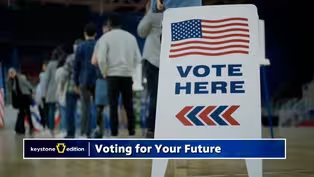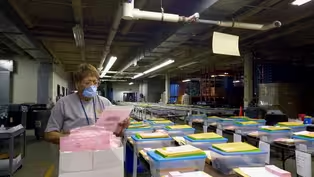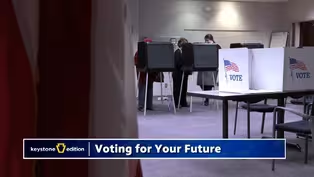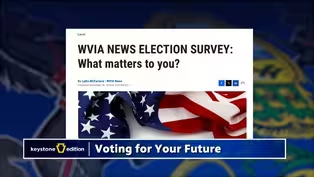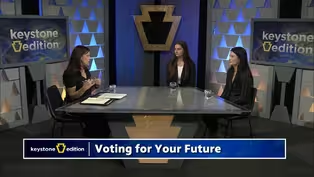Keystone Edition
Election Insights
Clip: 10/7/2024 | 8m 14sVideo has Closed Captions
Borys Krawczeniuk and Lydia McFarlane from WVIA News discuss the upcoming election.
Borys Krawczeniuk and Lydia McFarlane from WVIA News discuss the upcoming election.
Problems playing video? | Closed Captioning Feedback
Problems playing video? | Closed Captioning Feedback
Keystone Edition is a local public television program presented by WVIA
Keystone Edition
Election Insights
Clip: 10/7/2024 | 8m 14sVideo has Closed Captions
Borys Krawczeniuk and Lydia McFarlane from WVIA News discuss the upcoming election.
Problems playing video? | Closed Captioning Feedback
How to Watch Keystone Edition
Keystone Edition is available to stream on pbs.org and the free PBS App, available on iPhone, Apple TV, Android TV, Android smartphones, Amazon Fire TV, Amazon Fire Tablet, Roku, Samsung Smart TV, and Vizio.
Providing Support for PBS.org
Learn Moreabout PBS online sponsorship- That was Borys Krawczeniuk reporting.
He is here with us now, as well as Lydia McFarlane, two "WVIA News" journalists.
They're gonna provide some insight on the election.
Let's start with the presidential race and where it stands nationwide here in Pennsylvania.
We're gonna take a look at some poll numbers right now across the country here, Kamala Harris ahead 49.3% to Donald Trump's 47.1%.
Again, that's RealClearPolitics average polls as of Thursday, October the third.
Presidential race across Pennsylvania, Kamala Harris, 48.2%.
This one has them in a dead heat across Pennsylvania.
First of all, can we talk about polls in general?
Borys, I would love your thought about this.
Are polls to be watched?
It seems like sometimes we're surprised by polls.
- If you understand the way polls work, they're useful.
If you're looking at them as a way of predicting what's going to happen, don't do that, because they're really just a snapshot.
They reflect what voters are thinking when the questions are asked.
So it's whatever period of time that the poll happened, you know, five or six days, sometimes over a week, that's what happened.
They're also a little less reliable than they used to be because people are tired of picking up their telephones and don't answer polls, and the numbers that they do.
So there's a lot more modeling going on, which means they try to infer results and guess a little more than they used to.
Generally they're right, even though the polls showed Hillary Clinton winning 2016, she had a majority, she did best in the polls, that's not how we elect presidents.
Donald Trump won the electoral college, same thing in 2020.
- You can put some stock into them, - Sure.
- But nothing that we're gonna- - They're not gospel.
- Yeah, interesting.
Alright, let's talk about what you are both hearing, 'cause you've both been doing a lot of political reporting here in the last couple of months.
Lydia, let's talk about some of the topics that you are reporting on.
What are you hearing right there?
- Yeah, absolutely.
So I worked on a survey of voters in our region, and those survey results gauged that the top issues for local voters are, no surprise, the economy and women's health, but also gun control, social security and the environment, which was a bit of a surprise to me.
I thought, you know, economy and abortion, women's rights would be top two.
They actually came in at two and three with environment at number one.
- Environment, really?
- So, yeah, yeah.
I think it might have to do with, you know, the rural areas that we cover.
But that was a really big issue for people who took our survey.
But again, also economy and women's health, like, we're hearing from, you know, national polling, national coverage are really important issues for voters right here as well.
- Borys, what are you hearing?
- The economy is the number one issue for everybody.
So if you add up, in the most recent Franklin & Marshall Poll, if you add up economy and personal finances, it's almost 1/3 of the electorate.
I think that's the most important issue facing Pennsylvania.
But when you drill down a little bit, there's healthcare and reproductive healthcare.
Abortion are playing a much more prominent role in this election than they have in previous elections.
But the economy, and whether or not Donald Trump can maintain his edge on that, you know, that's kind of gonna be where the election in Pennsylvania's decided.
- I heard you say that the eighth congressional race is one of the hottest in the nation.
Why is everyone watching that?
- Because it's a district that Donald Trump won twice pretty decisively, and it's a district that Republicans think they can flip.
It's a district that Matt Cartwright has won, now he is going for his seventh term.
And the last three elections, he has had really tough, well-funded opponents, and he's won each by narrower margins.
So two years ago it was like 7,000 votes.
In previous elections it was a little higher.
So they think that with Trump back on the ballot, the Republicans do think that maybe this is the time, and a younger candidate, a different candidate than the last two times, that they can take out Cartwright.
- Hmm, those polls we were showing, the nationwide versus Pennsylvania poll, anything surprise you there?
I mean, obviously we know Pennsylvania is very much in play this election, but does anything surprise you there with those numbers?
- No, he's, you know, Trump has advantages in certain states because he has just been around longer.
And so I think she's gonna have to get, you know, spend some more time in Pennsylvania to boost those numbers a little bit.
- Of course there are some other races of importance, including one here in Pennsylvania for U.S. Senate.
Bob Casey with 48.8%, his challenger, Dave McCormick, 44.8%.
Again, RealClearPolitics as of Thursday, October the third.
Is this a smaller margin than we've seen for Senator Casey?
- McCormick is far better.
He's a far better candidate.
He is far better funded than Lou Barletta was, than Tom Smith was in 2012.
In 2006, Rick Santorum had more money than Bob Casey, but Bob Casey, the environment favored Casey.
But Dave McCormick is a much better candidate and is better funded than the last two candidates.
- I wanted to ask you, we had someone just a few minutes ago tell us that in 2016 it's when she was really watching.
What got you so interested in politics?
- I'd say 2008 was probably the first election that I was, you know, conscious for and understanding.
But then being in high school during the 2016 election, that's when I probably started paying attention more and realizing, you know, this is a conversation that parents are having, teachers are having.
These are results that could have real impacts on my life.
So then went through high school really interested in politics, went to college and majored in political science to kind of understand how do these elections shape our lives here at home, here in northeastern Pennsylvania?
How does the result of the presidential election impact little old me?
So that's something that I've always been really interested in, and that I'm thrilled to be reporting on now.
- What else came up in the survey?
I'm curious to know.
- Yeah, so like I said, environment was a really big one and legalization of marijuana was a big one as well.
Immigration did come up.
It wasn't one of the top five, but it did come up as a big issue for a lot of voters.
And it seemed that a lot of the issues were intertwined.
So I did a lot of follow-up interviews with voters and it seemed like if you're concerned about the economy, you know, there were people that were tying the economy to immigration and saying immigration is impacting the economy, or tying women's health to the environment.
And it just seemed like there was a lot of overlap - Lots of overlap - In the issues.
And it seems like a lot of people are more multi-issue voters than we give them credit for, which I think was surprising because I thought I was going to go into these interviews saying, "Okay, you're voting with your head, you know, set straight towards economy or straight towards women's health."
But it seemed like it was a lot broader.
And from those interviews, I also spoke to some people who were saying, "You know, I'll vote for the Republican at the top of the ticket, but I'm gonna vote for the Democrat here."
So there were people that were voting, you know, in and out of party lines, depending on the candidate.
Like we were just talking about the race with Casey and McCormick.
A lot of people, even if they were registered republicans, were saying, "You know, I don't trust him.
I'm not sold on McCormick because of, you know, his history of where he's lived and what he's done for a living."
A lot of people just seemed to like Bob Casey from those interviews that I had.
So that's something that came up as well, outside of issues, is that people vote, you know, I think a lot more in a well-rounded way than, you know, we tend to give them credit for.
- Oh, that's true.
- That's an interesting point.
You're gonna be able to hear from Matt Cartwright and Rob Bresnahan.
They're gonna be facing off in a live debate later this month.
WVIA will present Pennsylvania's eighth congressional district debate.
That's Tuesday, October 22nd at 7:00 PM from the Burke Auditorium at the campus of King's College in Wilkes-Barre.
That debate will air live on WVIA TV and also be simulcast live on WVIA radio, and live streamed at wvia.org.
One more thing before we let you go,
Video has Closed Captions
Clip: 10/7/2024 | 1m 57s | Attention is on key races in Pennsylvania that could shape the future of Congress & state leadership (1m 57s)
Voting for Your Future - Election 2024: Preview
Preview: 10/7/2024 | 30s | Watch Monday, October 7th at 7pm on WVIA TV (30s)
Voting for Your Future - Overview
Video has Closed Captions
Clip: 10/7/2024 | 50s | In the fifth season premiere of Keystone Edition Reports, we discuss the upcoming general election (50s)
Video has Closed Captions
Clip: 10/7/2024 | 1m 42s | WVIA News surveyed prospective voters in NE & central PA to find out what issues are import to them. (1m 42s)
Video has Closed Captions
Clip: 10/7/2024 | 12m 33s | An interview with young Republicans and Democrats from local Universities. (12m 33s)
Providing Support for PBS.org
Learn Moreabout PBS online sponsorship
- News and Public Affairs

Top journalists deliver compelling original analysis of the hour's headlines.

- News and Public Affairs

FRONTLINE is investigative journalism that questions, explains and changes our world.












Support for PBS provided by:
Keystone Edition is a local public television program presented by WVIA
